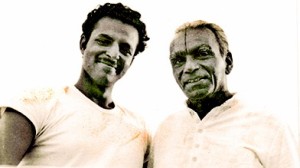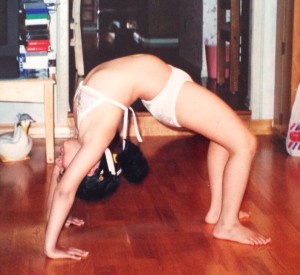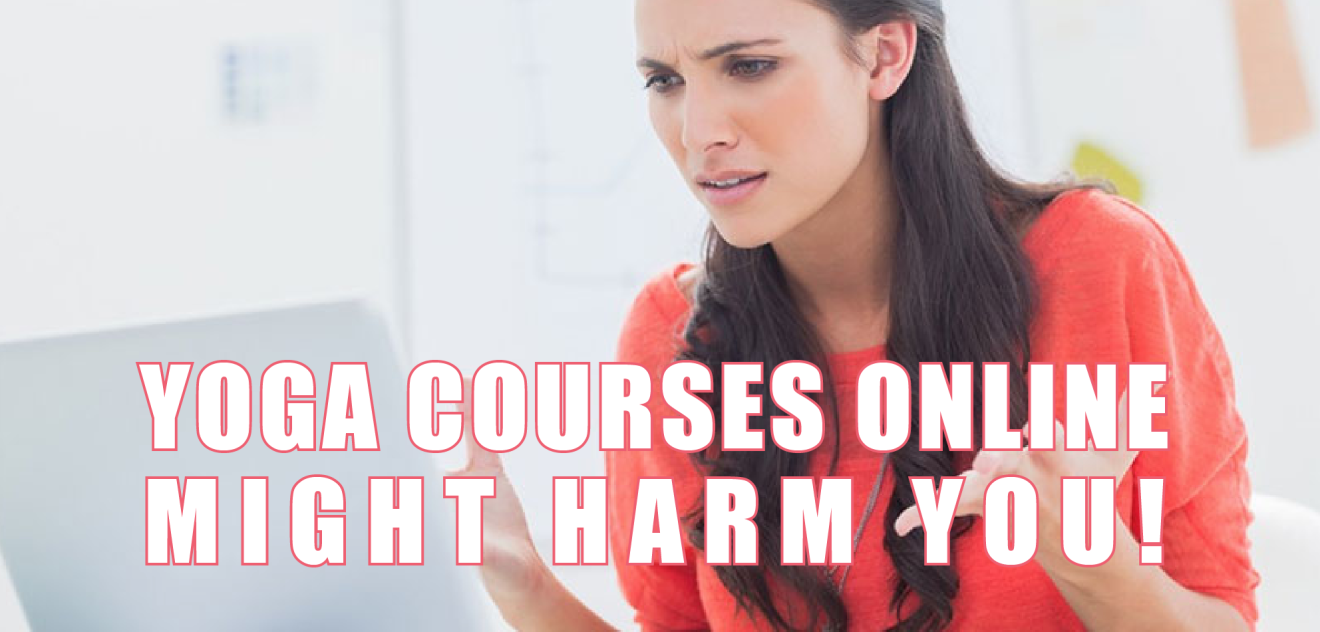The “yoga” industry is not new to me. I was born into the yoga world due to my father Aadil Palkhivala who is a world renowned yoga (asana) teacher. He studied with BKS Iyengar since he was 7 years old and was the youngest to receive the Advanced Yoga Teachers Certificate by BKS Iyengar. 
Yoga teacher trainings are a huge part of my mission. A happy student begins with an educated, qualified and professional teacher. My family’s studio “Alive & Shine Center” was founded in 1992, in the Seattle area, and our family also created The College of Purna Yoga (our studio is the home-base) an elite yoga college that offers 200hr, 500hr and the only college to offer 2,000hr certification levels. Our studio and the college is a huge part of my life and because it means so much to me that the yoga industry embrace high quality professional teachers with safe students, I felt the need to write about the online yoga teacher training revolution.
You might be wondering why I keep mentioning asana and putting yoga in quotes, I’ll explain. See, yoga is not really yoga. Yoga truly means “unity” or “union” in Sanskrit, asana translates to “poses” or “postures” and is the poses. So, when you’re taking a “yoga class” you’re actually not, you’re taking an asana class. In india its often referred to as yogasana, but seldom known simply as yoga. It’s like how people say “chai tea” when chai actually means tea, so that’d translate to “tea tea”… basically the term yoga has been misunderstood. Yoga is a lifestyle of a deep oneness journey, something my mother taught me through her teachings and Heartfull Meditation, and asana is an aspect of that journey for the physical form. All yoga teachers are technically just asana teachers. Being able to guide someone into true oneness which is yoga’s goal, means having all the elements of yoga. Which is not just asana, it’s a lifestyle.
But asana itself has been tainted with watered down teachings.
You probably have heard about the many people who complain about body pain and muscle/body damage due to “yoga” classes. As co-owner of our studio, a major complaint from the students that come from other studios is that they hurt their body through other forms of yoga (asana). They were going to give up but decided to try our studio and finally felt that they were given individual unique attention and taken care of. The constant comments about yoga-asana damaging people’s body is why my family’s yoga studio and our yoga college is dedicated to teaching quality and safety, as well as being very passionate about yearly continuing education for our yoga teachers. My parents who founded our college (experts in the yoga-asana and meditation field) teach the continuing education themselves.

Online yoga teacher trainings do not give the opportunity for aspiring yoga teachers to truly be aware of all the levels of safety that is important in a yoga teacher. I know a lot about online courses and I know how people have underrated and dismissed the importance of deep education in all the aspects of yoga safety. If you mix both the ignorance of what yoga truly is and the convenience of online studying… you end up with teachers that truly may cause harm to your body. And if you’re that teacher, you might cause harm to other’s bodies.
When I was in college, a few years back, the online college class revolution had just begun. It was new, interesting and really convenient for people with hectic schedules or people who couldn’t find a way to go to college in person. It was a last resort for most of us due to not being able to be in person. Most of my classes were online, including psychology, history, writing and music. The basics of psychology was an amazing class to do online because it was mostly just memorizing information about studies, mental states, experiences and so forth. Since you’re mostly focusing on the mind and how it reacts, what influences it, stories and so forth, it doesn’t need to be in person as much at that point. I got A’s and B’s for mostly every online class I took.
But then it happened. Some of you may know I’m a musician and singer-songwriter. I’ve played piano for 13 years (taught for over 4 years by Akiko and Forrest Kinney whose teacher’s teacher was Franz Liszt), self-taught guitarist of 8 years, written/composed over 200 songs and lyrics as well as producing/writing/singing/performing and creating my songs/albums on my own at home. Ok, so where am I going with this? Well, that online music class I took in college… I failed it. Miserably. Agh! In fact, I sent some of the work my teacher wanted me to do in that online class to my piano teacher (remember my piano teacher was Litzt’s student’s student) and he said this was so advanced and complex even he didn’t understand a lot of it. Weirdly some of the students who had no education about music actually passed! But some of the other fellow musicians got very low grades like me! Visa versa. But why?
I decided to find a ride and speak to my teacher in person. He said he personally didn’t feel it was a good class to be online. He knew it was too complicated, but he said he had no option and that many had to re-take the course and chose to re-take in person. The course was too complex to fully understand online, it needed to be in person for the subtle melodies and points our teacher was trying to convey. Not only that, but for the questions that students may have but not be able to ask as freely as one would in person/in the moment.
For something as intricate as this music course, and music itself, it was hard to understand the nuances our teacher needed us to know for us to pass this particular class. Many of those who passed had great memories and memorized the words so they passed the online tests, but many didn’t understand fully what they were memorizing. Just like with most schooling, the one with the best memory passes but often we forget what we memorized and we haven’t truly become what we learned. I can’t do that, I have to truly understand something in order to memorize it.
In my college you couldn’t even take most science classes and health classes online. Why? Because they need you to do labs, they need to know if you TRULY understand by asking many questions and listening to your questions, they need you to touch and be immersed in the studies. Because its a body, it’s a person, it’s a lifestyle and you have to be aware of all the aspects of it. If you have the responsibility to uphold the well-being of a person’s life or body, you have a huge job.
You know how texting something to someone doesn’t invoke all the feeling, the energy, the tonality and the real-ness of speaking in person? How misunderstandings can arise from a text just due to tonality? Well, a similar thing happens in the world of online vs. in-person studying.
It began with online yoga classes. Online “yoga” classes were introduced into the world of yoga through some very big names and big websites. Apps and online classes started sprouting from the internet, ads on Facebook, and the amazing convenience of online classes constantly advertised. Convenience works when harm is not in the picture. But, with online classes (often just videos you follow), no teacher is watching you or making sure your shoulders are safe in the pose, or your knee is safe from damage. No one is there to see you, protect you, or keep you safe. They can’t learn about your limits, where you excel… they don’t know you and they can’t help you know your own body better. That’s what yoga really wants to do, it wants you to know you more so you can live from your soul. So that your body and mind can be brought to the wisdom of the soul. Safety is key.
I really don’t know if I can stress the word safe enough in this article.
Real Yoga Teachers are gemstones in a world where real yoga is no longer seemingly important, including safety. Courses, colleges, classes, they can all say they focus on safety. But how do you (as the student or the aspiring teacher) know that is the case? Safety is simply making sure the lineage of the teacher who is teaching you comes from someone very educated in alignment-based and safety-based anana. This is rare. Alignment-based asana makes sure you’re not just flailing about, but truly in alignment which often keeps you safe. Remember, asana (postures in yoga) is not gymnastics exercises. They might look similar, but asana is not just warm-ups, it’s much more than that, but that’s a totally different article.
Yoga means unity in Sanskrit. Asana is the postures.
As I mentioned before, my father is Aadil Palkhivala, one of the foremost well known people in the advanced yoga-asana world. He has been teaching and learning yoga-asana for over 40 years. My mother created Heartfull Meditation and Lifestyle based on over 30 years of meditation and incredible life experience.
Our college that my father and mother founded (the college of Purna Yoga) is based in alignment and safety. We know yoga is not just asana, it’s a lifestyle. If you’re teaching a class and you don’t have the in-person tools to keep a body safe, you put your students at risk. Which is why so many “yoga” teachers are inexperienced and end up causing issues for their students. So many people get hurt in yoga due to teachers who do not learn safety and proper alignment to teach their students. Nothing can replace live contact, that is absolutely true.
Online learning is even risky just for taking normal asana classes, but it’s even worse to think you can certify someone online without having them meet anyone in person. Anatomy in real asana requires being able to feel the muscles and understand which postures done incorrectly will damage the body, and how the most subtle of changes can affect your student. Please if you’re going to be a teacher… Learn in person. Please. Nothing replaces being there in person. A human body is intricate and to study online how to keep a body safe, will not keep a body safe. Please don’t give into online teacher trainings. Learn from a course in person so that you can truly keep people safe and aligned. Please.
Remember, every body is unique and every person is different. There are so many different body types and levels of fitness that being in person in the yoga world is immensely important. Yoga (asana) is not something to do for fun, you are responsible for the bodies in your class. Your teacher is responsible for your body, what you learn and what you teach others. Asana is a type of physical therapy, and your students need to know you can keep them safe.
When your education is of high quality, your services are of high quality. We’ve seen many really superb small businesses and products disappear because the business world has turned into bargain mentality which leaves little room for quality, professionalism and true growth as a human being. My family’s studio is not a bargain studio, we are a quality studio because we want to help you be the absolute magnificence you are meant to be. We will not be a bargain studio and give YOU less than you deserve. You deserve the best, your students deserve the best. The best in yoga means safety, professionalism and education. The same base of any industry that focuses on health and the body.
Someone who graduates from Harvard has more of a reputation of being worthy than that of someone who graduates from a community college. Why? Because of quality. I don’t think we realize that a real safety, alignment-based and worthy yoga teacher is truly someone we should respect and hold as dear as anyone we allow to hold our health in their hands.
- Matt Rife makes a 1700s joke about domestic violence - November 22, 2023
- Shadowbanned on Facebook? - October 31, 2023
- The origin of cisgender - September 20, 2023


Comments 1
agreed